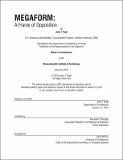Megaform : a frame of opposition
Author(s)
Pugh, John T
DownloadFull printable version (103.6Mb)
Other Contributors
Massachusetts Institute of Technology. Dept. of Architecture.
Advisor
Alexander D'Hooghe.
Terms of use
Metadata
Show full item recordAbstract
The city is no more, only an endless urban corridor remains. As our cities have grown outwards over the past 100 years civic identity has been destroyed and the public realm has been lost. Inexpensive land values, the widespread adoption of the internal combustion automobile, government subsidies and propaganda have resulted in a homogenized and privatized city with no identifiable center or clearly defined boundaries. How might one establish identifiable civic landmarks in these conditions? How could a novel technology, such as the electric vehicle be employed to bring about an alternative urban reality? To address these questions this project interrogates the typological concepts of the Urban Core and the Megaform. Through historical and typological research this thesis establishes a lineage of both of these concepts and then speculates about the ability of these models to influence the city. This thesis proposes 2 novel models an Urban Core type and a Megaformal Urban Wall Building type. The Urban Wall Building typology creates an interiorized urban realm where a linear public promenade facilitates a new urban landscape that is best described by its radicalized sectional experience. This type is a piece of the larger urban core typology that strategically clips out a piece the urban fabric to define a space of opposition, civitas and ultimately, Metropolitan Urbanity. Through the design of enclosure types, overpass infrastructures and a novel public terrain, this project questions the potentialities for an architecture and urbanism of the electric vehicle. (cont.) In the following pages you will find a proposal that addresses the chaos of the city through the projection of the Megaform into today's cityscape. Through the development of the Megaform as a recognizable entity this thesis speculates about the future of the city and the potential of Architecture to redefine it.
Description
Thesis (M. Arch.)--Massachusetts Institute of Technology, Dept. of Architecture, 2010. This electronic version was submitted by the student author. The certified thesis is available in the Institute Archives and Special Collections. Cataloged from student submitted PDF version of thesis. Includes bibliographical references (p. 97-99).
Date issued
2010Department
Massachusetts Institute of Technology. Department of ArchitecturePublisher
Massachusetts Institute of Technology
Keywords
Architecture.